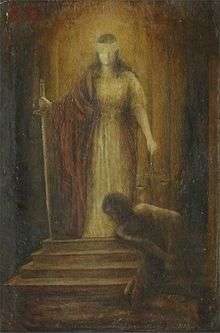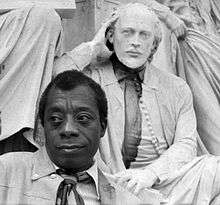James Arthur Baldwin (2 August 1924 – 1 December 1987) was an American novelist, short story writer, playwright, essayist, and social critic.
Quotes
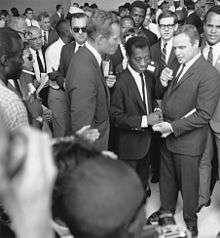
Everything depends on how relentlessly one forces from experience the last drop, sweet or bitter, it can possibly give.
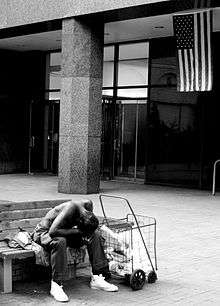
Anyone who has ever struggled with poverty knows how extremely expensive it is to be poor.
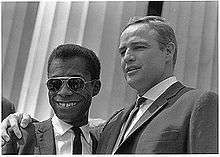
Now, it is true that the nature of society is to create, among its citizens, an illusion of safety; but it is also absolutely true that the safety is always necessarily an illusion. Artists are here to disturb the peace.
- All over Harlem, Negro boys and girls are growing into stunted maturity, trying desperately to find a place to stand; and the wonder is not that so many are ruined but that so many survive.
- "The Harlem Ghetto" in Commentary (February 1948); republished in Notes of a Native Son (1955)
- Confronted with the impossibility of remaining faithful to one’s beliefs, and the equal impossibility of becoming free of them, one can be driven to the most inhuman excesses.
- "Stranger in the Village," Harper's (October 1953); republished in Notes of a Native Son (1955)
- The betrayal of a belief is not the same thing as ceasing to believe. If this were not so there would be no moral standards in the world at all.
- Stranger in the Village Harper's Magazine (October 1953); republished in Notes of a Native Son (1955)
- I imagine one of the reasons people cling to their hates so stubbornly is because they sense, once hate is gone, they will be forced to deal with pain.
- "Me and My House" in Harper's (November 1955); republished in Notes of a Native Son (1955)
- Words like "freedom," "justice," "democracy" are not common concepts; on the contrary, they are rare. People are not born knowing what these are. It takes enormous and, above all, individual effort to arrive at the respect for other people that these words imply.
- "The Crusade of Indignation," The Nation (New York, 7 July 1956), published in book form in The Price of the Ticket (1985)
- Any real change implies the breakup of the world as one has always known it, the loss of all that gave one an identity, the end of safety. And at such a moment, unable to see and not daring to imagine what the future will now bring forth, one clings to what one knew, or dreamed that one possessed. Yet, it is only when a man is able, without bitterness or self-pity, to surrender a dream he has long cherished or a privilege he has long possessed that he is set free — he has set himself free — for higher dreams, for greater privileges.
- "Faulkner and Desegregation" in Partisan Review (Fall 1956); republished in Nobody Knows My Name: More Notes of a Native Son (1961)
- I have not written about being a Negro at such length because I do not expect that to be my only subject, but only because it was the gate I had to unlock before I could hope to write about anything else.
- "The Hard Kind of Courage" in Harper's (October 1958) republished as "A Fly in Buttermilk" in Nobody Knows My Name: More Notes of a Native Son (1961)
- I conceive of God, in fact, as a means of liberation and not a means to control others.
- "In Search of a Majority" address delivered at Kalamazoo College (February 1960); republished in Nobody Knows My Name: More Notes of a Native Son (1961)
- All art is a kind of confession, more or less oblique. All artists, if they are to survive, are forced, at last, to tell the whole story, to vomit the anguish up.
- "The Precarious Vogue of Ingmar Bergman" in Esquire (April 1960); republished as "The Northern Protestant" in Nobody Knows My Name: More Notes of a Native Son (1961) and in The Price of the Ticket (1985)
- Anyone who has ever struggled with poverty knows how extremely expensive it is to be poor.
- "Fifth Avenue, Uptown: a Letter from Harlem" in Esquire (July 1960); republished in Nobody Knows My Name: More Notes of a Native Son (1961)
- Art has to be a kind of confession. I don't mean a true confession in the sense of that dreary magazine. The effort it seems to me, is: if you can examine and face your life, you can discover the terms with which you are connected to other lives, and they can discover them, too — the terms with which they are connected to other people.
- "An interview with James Baldwin" (1961); an interview with Studs Terkel published in Conversations With James Baldwin (1989)
- You read something which you thought only happened to you, and you discover that it happened 100 years ago to Dostoyevsky. This is a very great liberation for the suffering, struggling person, who always thinks that he is alone. This is why art is important. Art would not be important if life were not important, and life is important.
- "An interview with James Baldwin" (1961)
- Most of us, no matter what we say, are walking in the dark, whistling in the dark. Nobody knows what is going to happen to him from one moment to the next, or how one will bear it. This is irreducible. And it's true of everybody. Now, it is true that the nature of society is to create, among its citizens, an illusion of safety; but it is also absolutely true that the safety is always necessarily an illusion. Artists are here to disturb the peace.
- "An interview with James Baldwin" (1961), in Conversations with James Baldwin, p. 21
- At the rate things are going here, all of Africa will be free before we can get a lousy cup of coffee.
- "A Negro Assays on the Negro Mood," The New York Times, 12 March 1961, published in book form as "East River, Downtown: Postscript to a Letter from Harlem" in Nobody Knows My Name: More Notes of a Native Son (1961)
- The price one pays for pursuing any profession or calling is an intimate knowledge of its ugly side.
- "The Black Boy Looks at the White Boy" in Esquire (May 1961); republished in Nobody Knows My Name: More Notes of a Native Son (1961)
- Nobody is more dangerous than he who imagines himself pure in heart; for his purity, by definition, is unassailable.
- "The Black Boy Looks at the White Boy" in Esquire (May 1961)
- The roles that we construct are constructed because we feel that they will help us to survive and also, of course, because they fulfill something in our personalities; and one does not, therefore, cease playing a role simply because one has begun to understand it. All roles are dangerous. The world tends to trap you in the role you play and it is always extremely hard to maintain a watchful, mocking distance between oneself as one appears to be and oneself as one actually is.
- "The Black Boy Looks at the White Boy" in Esquire (May 1961)
- Money, it turned out, was exactly like sex. You thought of nothing else if you didn't have it and thought of other things if you did.
- "The Black Boy Looks at the White Boy" in Esquire (May 1961)
- The primary distinction of the artist is that he must actively cultivate that state which most men, necessarily, must avoid: the state of being alone.
- "The Creative Process" (1962) originally published in The National Culture Center's Creative America (1962) and later published in The Price of the Ticket (1985)
- Not everything that is faced can be changed. But nothing can be changed until it is faced. … Most of us are about as eager to change as we were to be born, and go through our changes in a similar state of shock.
- "As Much Truth As One Can Bear" in The New York Times Book Review (14 January 1962); republished in The Cross of Redemption: Uncollected Writings (2011), edited by Randall Kenan
- Perhaps the whole root of our trouble, the human trouble, is that we will sacrifice all the beauty of our lives, will imprison ourselves in totems, taboos, crosses, blood sacrifices, steeples, mosques, races, armies, flags, nations, in order to deny the fact of death, which is the only fact we have.
- "Letter from a Region of My Mind" in The New Yorker (17 November 1962); republished as "Down at the Cross: Letter from a Region in My Mind" in The Fire Next Time (1963)
- Christianity has operated with an unmitigated arrogance and cruelty — necessarily, since a religion ordinarily imposes on those who have discovered the true faith the spiritual duty of liberating the infidels.
- "Letter from a Region of My Mind" in The New Yorker (17 November 1962); republished as "Down at the Cross: Letter from a Region in My Mind" in The Fire Next Time (1963)
- If the concept of God has any validity or any use, it can only be to make us larger, freer, and more loving. If God cannot do this, then it is time we got rid of Him.
- "Letter from a Region of My Mind" in The New Yorker (17 November 1962); republished as "Down at the Cross: Letter from a Region in My Mind" in The Fire Next Time (1963)
- I do not know many Negroes who are eager to be "accepted" by white people, still less to be loved by them; they, the blacks, simply don't wish to be beaten over the head by the whites every instant of our brief passage on this planet. White people will have quite enough to do in learning how to accept and love themselves and each other, and when they have achieved this — which will not be tomorrow and may very well be never — the Negro problem will no longer exist, for it will no longer be needed.
- "Letter from a Region of My Mind" in The New Yorker (17 November 1962); republished as "Down at the Cross: Letter from a Region in My Mind" in The Fire Next Time (1963)
- Whatever white people do not know about Negroes reveals, precisely and inexorably, what they do not know about themselves.
- The Fire Next Time (1963)
- It will be a great day for America, incidentally, when we begin to eat bread again, instead of the blasphemous and tasteless foam rubber that we have substituted for it. And I am not being frivolous here, either. Something very sinister happens to the people of a country when they begin to distrust their own reactions as deeply as they do here, and become as joyless as they have become.
- The Fire Next Time (1963)
- If the word integration means anything, this is what it means: that we, with love, shall force our brothers to see themselves as they are, to cease fleeing from reality and begin to change it.
- The Fire Next Time (1963)
- One must say Yes to life, and embrace it wherever it is found — and it is found in terrible places. … For nothing is fixed, forever and forever, it is not fixed; the earth is always shifting, the light is always changing, the sea does not cease to grind down rock. Generations do not cease to be born, and we are responsible to them because we are the only witnesses they have. The sea rises, the light fails, lovers cling to each other and children cling to us. The moment we cease to hold each other, the moment we break faith with one another, the sea engulfs us and the light goes out.
- From Nothing Personal, a collaboration with the photographer Richard Avedon (1964). Baldwin's text for the volume can be found "here".
- You think your pain and your heartbreak are unprecedented in the history of the world, but then you read. It was Dostoevsky and Dickens who taught me that the things that tormented me most were the very things that connected me with all the people who were alive, or who ever had been alive. Only if we face these open wounds in ourselves can we understand them in other people. An artist is a sort of emotional or spiritual historian. His role is to make you realize the doom and glory of knowing who you are and what you are. He has to tell, because nobody else can tell, what it is like to be alive.
- As quoted in "Doom and glory of knowing who you are" by Jane Howard, in LIFE magazine, Vol. 54, No. 21 (24 May 1963), p. 89; a part of this statement has often been quoted as it was paraphrased in The New York Times (1 June 1964):
- It was books that taught me that the things that tormented me most were the very things that connected me with all the people who were alive, or who had ever been alive.
- Now, leaving aside all the physical factors one can quote — leaving aside the rape or murder, leaving aside the bloody catalogue of oppression which we are too familiar with any way — what the system does to the subjugated is to destroy his sense of reality. It destroys his father's authority over him. His father can no longer tell him anything because his past has disappeared.
- "The American Dream and the American Negro" in The New York Times (7 March 1965)
- It is true that two wrongs don't make a right, as we love to point out to the people we have wronged. But one wrong doesn't make a right, either. People who have been wronged will attempt to right the wrong; they would not be people if they didn't. They can rarely afford to be scrupulous about the means they will use. They will use such means as come to hand. Neither, in the main, will they distinguish one oppressor from another, nor see through to the root principle of their oppression.
- "Negroes Are Anti-Semitic Because They're Anti-White" in The New York Times (9 April 1967)
- When the Israelis pick up guns, or the Poles, or the Irish, or any white man in the world says “give me liberty, or give me death,” the entire white world applauds. When a black man says exactly the same thing, word for word, he is judged a criminal and treated like one and everything possible is done to make an example of this bad nigger so there won't be any more like him.
- on The Dick Cavett Show (1968), as reproduced in I Am Not Your Negro: A Companion Edition to the Documentary Film (2017)
- If any white man in the world says, "Give me liberty or give me death," the entire white world applauds. When a black man says exactly the same thing, he is judged a criminal and treated like one and everything possible is done to make an example of this bad nigger so there won't be any more like him.
- as edited for the trailer to the film I Am Not Your Negro (2016)
- If any white man in the world says, "Give me liberty or give me death," the entire white world applauds. When a black man says exactly the same thing, he is judged a criminal and treated like one and everything possible is done to make an example of this bad nigger so there won't be any more like him.
- The prison is overcrowded, the calendars full, the judges busy, the lawyers ambitious, and the cops zealous. What does it matter if someone gets trapped here for a year or two, gets ruined here, goes mad here, commits murder or suicide here? It's too bad, but that's the way the cookie crumbles sometimes. I do not claim that everyone in prison here is innocent, but I do claim that the law, as it operates, is guilty, and that the prisoners, therefore, are all unjustly imprisoned. Is it conceivable, after all, that any middle-class white boy — or, indeed, almost any white boy — would have been arrested on so grave a charge as murder, with such flimsy substantiation, and forced to spend, as of this writing, three years in prison? What force, precisely, is operating when a prisoner is advised, requested, ordered, intimidated, or forced, to confess to a crime he has not committed, and promised a lighter sentence for so perjuring and debasing himself? Does the law exist for the purpose of furthering the ambitions of those who have sworn to uphold the law, or is it seriously to be considered as a moral, unifying force, the health and strength of a nation?
- No Name in the Street (1972)
- Well, if one really wishes to know how justice is administered in a country, one does not question the policemen, the lawyers, the judges, or the protected members of the middle class. One goes to the unprotected — those, precisely, who need the law's protection most! — and listens to their testimony. Ask any Mexican, any Puerto Rican, any black man, any poor person — ask the wretched how they fare in the halls of justice, and then you will know, not whether or not the country is just, but whether or not it has any love for justice, or any concept of it. It is certain, in any case, that ignorance, allied with power, is the most ferocious enemy justice can have.
- No Name in the Street (1972)
- People pay for what they do, and still more for what they have allowed themselves to become, and they pay for it, very simply, by the lives they lead.
- No Name in the Street (1972)
- People who treat other people as less than human must not be surprised when the bread they have cast on the waters comes floating back to them, poisoned.
- No Name in the Street (1972)
- The civilized have created the wretched, quite coldly and deliberately, and do not intend to change the status quo; are responsible for their slaughter and enslavement; rain down bombs on defenseless children whenever and wherever they decide that their "vital interests" are menaced, and think nothing of torturing a man to death: these people are not to be taken seriously when they speak of the "sanctity" of human life, or the "conscience" of the civilized world.
- From chapter one of The Devil Finds Work (orig. pub. 1976), reprinted in The Price of the Ticket: Collected Nonfiction, 1948-1985
- It's no credit to this enormously rich country that there are more oppressive, less decent governments elsewhere. We claim superiority of our institutions. We ought to live up to our own standards, not use misery elsewhere as an endless source of self-gratification and justification. Of course, people tell me all the time in the West that they are trying, they are trying hard. Some have tears in their eyes and let me know how awful they feel about the way our poor live, our blacks, or those in dozens of other countries. People can cry much easier than they can change, a rule of psychology people like me picked up as kids on the street.
- As quoted in "James Baldwin Back Home" by Robert Coles in The New York Times (31 July 1977)
- The brutal truth is that the bulk of white people in American never had any interest in educating black people, except as this could serve white purposes. It is not the black child's language that is in question, it is not his language that is despised: It is his experience. A child cannot be taught by anyone who despises him, and a child cannot afford to be fooled. A child cannot be taught by anyone whose demand, essentially, is that the child repudiate his experience, and all that gives him sustenance, and enter a limbo in which he will no longer be black, and in which he knows that he can never become white. Black people have lost too many black children that way.
- "If Black English Isn't a Language, Then Tell Me, What Is?" in "The New York Times (29 July 1979)
- I knew Richard [Wright] and I loved him. [...] I was not attacking him; I was trying to clarify something for myself.
- Interview with Julius Lester, "James Baldwin: Reflections of a Maverick" in The New York Times (27 May 1984)
- Perhaps I did not succumb to ideology … because I have never seen myself as a spokesman. I am a witness. In the church in which I was raised you were supposed to bear witness to the truth. Now, later on, you wonder what in the world the truth is, but you do know what a lie is.
- Interview with Julius Lester, "James Baldwin: Reflections of a Maverick" in The New York Times (27 May 1984)
- You don't realize that you're intelligent until it gets you into trouble.
- Interview with Julius Lester, "James Baldwin: Reflections of a Maverick" in The New York Times (27 May 1984)
- The celebrity never sees himself. I have some idea what I'm doing on that stage; above all, I have some idea what sustains me on that stage. But the celebrity is not exactly Jimmy, though he comes out of Jimmy and Jimmy nourishes that, too. I can see now, with hindsight, that I would've had to become a celebrity in order to survive. A boy like me with all his handicaps, real and fancied, could not have survived in obscurity. I can say that it would have had to happen this way, though I could not see it coming.
- Interview with Julius Lester, "James Baldwin: Reflections of a Maverick" in The New York Times (27 May 1984)
- When the South has trouble with its Negroes — when the Negroes refuse to remain in their "place" — it blames "outside agitators" and "Northern interference." When the nation has trouble with the Northern Negro, it blames the Kremlin.
- As quoted in "Trapped Inside James Baldwin" by Michael Anderson, a review of Baldwin's Collected Essays in The New York Times (29 March 1998)
- Love does not begin and end the way we seem to think it does. Love is a battle, love is a war; love is a growing up.
- "In Search of a Majority: An Address" (Feb 1960); reprinted in Baldwin, "Nobody Knows My Name: More Notes of a Native Son" (1961)
Autobiographical Notes (1952)
- "Autobiographical Notes" (1952); republished in Notes of a Native Son (1955)
- I began plotting novels at about the time I learned to read. The story of my childhood is the usual bleak fantasy, and we can dismiss it with the restrained observation that I certainly would not consider living it again.
- Any writer, I suppose, feels that the world into which he was born is nothing less than a conspiracy against the cultivation of his talent — which attitude certainly has a great deal to support it. On the other hand, it is only because the world looks on his talent with such a frightening indifference that the artist is compelled to make his talent important. So that any writer, looking back over even so short a span of time as I am here forced to assess, finds that the things which hurt him and the things which helped him cannot be divorced from each other; he could be helped in a certain way only because he was hurt in a certain way; and his help is simply to be enabled to move from one conundrum to the next — one is tempted to say that he moves from one disaster to the next.
- When one begins looking for influences one finds them by the score. I haven't thought much about my own, not enough anyway; I hazard that the King James Bible, the rhetoric of the store-front church, something ironic and violent and perpetually understated in Negro speech — and something of Dickens' love for bravura — have something to do with me today; but I wouldn't stake my life on it. Likewise, innumerable people have helped me in many ways; but finally, I suppose, the most difficult (and most rewarding) thing in my life has been the fact that I was born a Negro and was forced, therefore, to effect some kind of truce with this reality. (Truce, by the way, is the best one can hope for.)
- One writes out of one thing only — one's own experience. Everything depends on how relentlessly one forces from this experience the last drop, sweet or bitter, it can possibly give. This is the only real concern of the artist, to recreate out of the disorder of life that order which is art.
- I don't like people who like me because I'm a Negro; neither do I like people who find in the same accident grounds for contempt. I love America more than any other country in the world, and, exactly for this reason, I insist on the right to criticize her perpetually. I think all theories are suspect, that the finest principles may have to be modified, or may even be pulverized by the demands of life, and that one must find, therefore, one's own moral center and move through the world hoping that this center will guide one aright. I consider that I have many responsibilities, but none greater than this: to last, as Hemingway says, and get my work done.
I want to be an honest man and a good writer.
Giovanni's Room (1956)
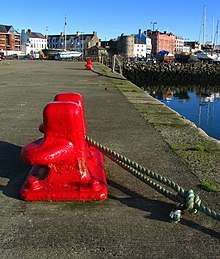
But people can't, unhappily, invent their mooring posts... Life gives these and also takes them away and the great difficulty is to say Yes to life.
- But people can't, unhappily, invent their mooring posts, their lovers and their friends, anymore than they can invent their parents. Life gives these and also takes them away and the great difficulty is to say Yes to life.
- Pt. 1, Ch. 1 - p.4-5 [Page numbers per the 2007 Penguin Books paperback edition.]
- I shall never be able to have any more of these boyish, zestful affairs — which are, really, when one thinks about it, a kind of higher, or, anyway, more pretentious masturbation. People are too various to be treated so lightly.
- Pt. 1, Ch. 1 - p.5
- 'Nobody can stay in the garden of Eden,' Jacques said. And then: 'I wonder why.'
I have thought about Jacques' question since. Everyone, after all, goes the same dark road — and the road has a trick of being most dark, most treacherous, when it seems most bright — and it's true that nobody stays in the garden of Eden. Perhaps everybody has a garden of Eden, I don't know; but they have scarcely seen their garden before they see the flaming sword. Then, perhaps, life only offers the choice of remembering the garden or forgetting it. Either, or.- Pt. 1, Ch. 2 - p.22
- 'I don't believe in this nonsense about time. Time is just common, it's like water for a fish. Everybody's in this water, nobody gets out of it, or if he does the same thing happens to him that happens to the fish, he dies. And you know what happens in this water, time? The big fish eat the little fish. That's all. The big fish eat the little fish and the ocean doesn't care.'
- Pt. 1, Ch. 2 - p.31
- 'And, at the risk of losing forever your so remarkably candid friendship, let me tell you something. Confusion is a luxury which only the very, very young can possibly afford, and you are not that young any more.'
- Pt. 1, Ch. 2 - p.36
- I am beginning to feel like part of a travelling circus.
- Pt. 1, Ch. 3 - p.45
- 'You think,' he persisted, 'that my life is shameful because my encounters are. And they are. But you should ask yourself why they are.'
'Why are they — shameful?' I asked him.
'Because there is no affection in them, and no joy. It's like putting an electric plug in a dead socket. Touch, but no contact. All touch, but no contact and no light.'- Pt. 1, Ch. 3 - p.49
- 'Love him,' said Jacques, with vehemence, 'love him and let him love you. Do you think anything else under heaven really matters? And how long, at the best, can it last, since you are both men and still have everywhere to go? Only five minutes, I assure you, only five minutes, and most of that, helas! in the dark. And if you think of them as dirty, then they will be dirty — they will be dirty because you will be giving nothing, you will be despising your flesh and his. But you can make your time together anything but dirty, you can give each other something which will make both of you better — forever — if you will not be ashamed, if you will only not play it safe. He paused, watching me, and then looked down to his cognac. 'You play it safe long enough,' he said, in a different tone, 'and you'll end up trapped in your own dirty body, forever and forever and forever — like me.'
- Pt. 1, Ch. 3 - p.50

You can give each other something which will make both of you better — forever — if you will not be ashamed, if you will only not play it safe.
- 'Somebody,' said Jacques, 'your father or mine, should have told us that not many people have ever died of love. But multitudes have perished, and are perishing every hour — and in the oddest places! — for the lack of it.'
- Pt. 1, Ch. 3 - p.51
- She is smiling and her eyes are kind but now the smile is purely social
- Pt. 1, Ch. 3 - p.62
- 'Maybe everything bad that happens to you makes you weaker, and so you can stand less and less.'
- Pt. 2, Ch. 3 - p.97
- He was silent for a long while. Then: 'You do, sometimes, remind me of the kind of man who is tempted to put himself in prison in order to avoid being hit by a car.'
- Pt. 2, Ch. 3 - p.104
- 'I felt so aimless — like a tennis ball, bouncing, bouncing — I began to wonder where I'd land.'
- Pt. 2, Ch. 4 - p.108
- Much has been written of love turning to hatred, of the heart growing cold with the death of love. It is a remarkable process. It is far more terrible than anything I have ever read about it, more terrible than anything I will ever be able to say.
- Pt. 2, Ch. 5 - p.139
Quotes about Baldwin
- I want to conclude by quoting from James Baldwin, a courageous writer who refused to let the hope of democracy die in his lifetime and who offered that mix of politics, passion and courage that deserves not just admiration but emulation. His sense of rage was grounded in a working-class sensibility, eloquence and passion that illuminates a higher standard for what it means to be a public intellectual and an engaged intellectual. His words capture something that is missing from the American cultural and political landscape, something affirmative that needs to be seized upon, rethought, and occupied - as part of both the fight against the new authoritarianism and its cynical, dangerous and cruel practices, and the struggle to reclaim a notion of justice and mutuality that seems to be dying in all of us.
- Henry Giroux in an Open Editorial entiteled "Why Don't Americans Care About Democracy at Home?" at Truthout (2 October 2012)
External links
- Baldwin's American Masters page
- Baldwin's C-Span page
- Baldwin in the Literary Encyclopedia
- Several brief biographical sketches
- "An Open Letter to My Sister, Angela Y. Davis" by James Baldwin
- Bedford-St. Martin's Baldwin essay page links
- Audio files of speeches and interviews at UC Berkeley
- Guardian Books "Author Page", with profile and links to further articles
This article is issued from
Wikiquote.
The text is licensed under Creative
Commons - Attribution - Sharealike.
Additional terms may apply for the media files.

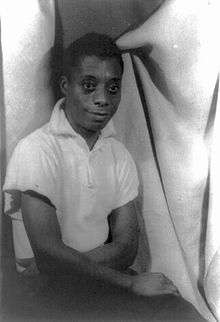
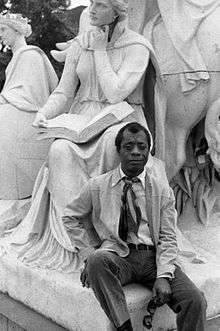
_-_NARA_-_542003.tif.jpg)
